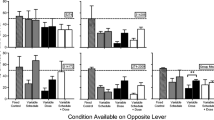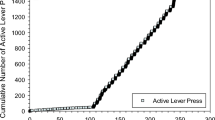Abstract
The purpose of the present study was to examine whether a history of responding under schedules that generate either high or low response rates could modify previously established cocaine self-administration. Eight experimentally naive rhesus monkeys were trained to respond on one of two levers under a fixed-interval (FI) 5-min schedule of intravenous cocaine (0.03 mg/kg per injection) presentation. When responding was stable a cocaine dose-response curve (saline, 0.01–0.3 mg/kg per injection) was determined. Following completion of the dose-response curves, the monkeys were randomly assigned to one of two groups (n=4/group) and trained to respond on the other lever under either a fixed-ratio (FR) 50 or inter-response times (IRT) > 30-s schedule of cocaine (0.03 mg/kg per injection) presentation. After 65 sessions responding was again maintained under the FI5-min schedule of 0.03 mg/kg per injection cocaine for 60 sessions, followed by redetermination of the cocaine dose-response curve. During the initial exposure to the FI schedule, the mean rate of responding was 4.02 (± 0.33) responses/min and the cocaine dose-response curve was characterized as an inverted-U shape function of dose, with peak responding at 0.03 mg/kg per injection. The FR50 schedule generated high rates (66.80 ± 5.6 responses/min), while response rates under the IRT > 30-s schedule were low (2.62 ± 0.2 responses/min). Following different behavioral histories, response rates under the FI5-min schedule were significantly higher for 60 sessions in FR-history monkeys compared to IRT-history subjects. Compared to the initial FI baselines, cocaine intake (mg/kg per session) was significantly higher following an FR-history and significantly lower following training under an IRT schedule, for 60 consecutive sessions. In addition, there was a significant effect of behavioral history on the cocaine dose-response curve, such that descending limb was shifted farther to the right in FR-history subjects compared to IRT-history monkeys. Results from the present study indicate that previously established “drug-seeking” behavior can be modified by training under different reinforcement schedules. Knowledge of such historical variables may be important in understanding the determinants of drug self-administration.
Similar content being viewed by others
References
Barrett JE (1977) Behavioral history as a determinant of the effects ofd-amphetamine on punished behavior. Science 198:67–69
Barrett JE, Glowa JR, Nader MA (1989) Behavioral and pharmacological history as determinants of tolerance- and sensitization-like phenomena in drug action. In: Goudie AJ, Emmett-Oglesby M (eds) Psychoactive drugs. Humana, Clifton, N.J., pp 181–219
Budney AJ, Higgins ST, Delaney DD, Kent L, Bickel WK (1991) Contingent reinforcement of abstinence with individuals abusing cocaine and marijuana. J Exp Anal Behav 24:657–665
Carroll ME, Lac ST, Nygaard SL (1989) A concurrently available nondrug reinforcer prevents the acquisition or decreases the maintenance of cocaine-reinforced behavior. Psychopharmacology 97:23–29
Catania AC, Reynolds GS (1968) A quantitative analysis of the responding maintained by interval schedules of reinforcement. J Exp Anal Behav 11:327–383
Crowley TJ (1984) Contingency contracting treatment of drug-abusing physicians, nurses, and dentists. In: Behavioral intervention techniques in drug abuse treatment, NIDA Research Monograph, #46. US Government Printing Office, Washington, DC, pp 68–83
Falk JL, Tang M (1989) Schedule induction of drug intake: differential responsiveness to agents with abuse potential. J Pharmacol Exp Ther 249:143–148
Herling S (1981) Natlrexone effects on food- and codeine-maintained responding in rhesus monkeys. Eur J Pharmacol 73:41–49
Higgins ST, Delaney DD, Budney AJ, Bickel WK, Hughes JR, Foerg F, Fenwick JW (1991) A behavioral approach to achieving initial cocaine abstinence. Am J Psychiatry 148:1218–1224
Lemaire GA, Meisch RA (1991) Relative reinforcing effects of pentobarbital solutions orally self-administered by rhesus monkeys under fixed-ratio and signalled DRL schedules. Psychol Rec 41:551–583
Meisch RA, Lemaire GA, Cutrell EB (1992) Oral self-administration of pentobarbital by rhesus monkeys: relative reinforcing effects of different drug amounts under signalled DRL schedules. Drug Alcohol Depend 30:215–225
Nader MA, Thompson T (1987) Interaction of methadone, reinforcement history and variable-interval performance. J Exp Anal Behav 48:303–315
Nader MA, Thompson T (1989) Interaction of reinforcement history with methadone on responding maintained under a fixed-interval schedule. Pharmacol Biochem Behav 32:643–649
Nader MA, Tatham TA, Barrett JE (1992) Behavioral and pharmacological determinants of drug abuse. Ann NY Acad Sci 654:368–385
Piazza PV, Deminiere J-M, Le Moal M, Simon H (1989) Factors that predict individual vulnerability to amphetamine self-administration. Science 245:1511–1513
Poling A, Krafft K, Chapman L (1980)d-Amphetamine, operant history, and variable-interval performance. Pharmacol Biochem Behav 12:559–562
Stitzer ML, Bigelow GE, Liebson I (1980) Reducing drug use among methadone maintenance clients: contingent reinforcement for morphine-free urines. Addict Behav 5:333–340
Urbain C, Poling A, Millam J, Thompson T (1978)d-Amphetamine and fixed-interval performance: effects of operant history. J Exp Anal Behav 29:385–392
Wanchisen BA, Tatham TA, Mooney SE (1989) Variable-ratio conditioning history produces high- and low-rate fixed-interval performance in rats. J Exp Anal Behav 52:167–179
Weiner H (1969) Controlling human fixed-interval performance. J Exp Anal Behav 12:349–373
Author information
Authors and Affiliations
Rights and permissions
About this article
Cite this article
Nader, M.A., Reboussin, D.M. The effects of behavioral history on cocaine self-administration by rhesus monkeys. Psychopharmacology 115, 53–58 (1994). https://doi.org/10.1007/BF02244751
Received:
Revised:
Issue Date:
DOI: https://doi.org/10.1007/BF02244751




